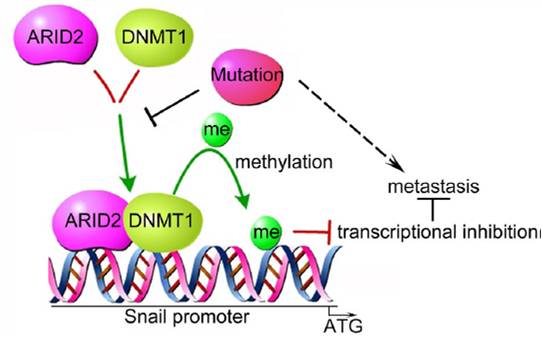ARID2 Suppresses Hepatocellular Carcinoma Metastasis via DNMT1-Snail Axis
A Recent study led by Dr. XIE Dong’s group from Shanghai Institute of Nutrition and Health of the Chinese Academy of Sciences revealed the role and mechanism of ARID2 in liver cancer metastasis, providing therapeutic targets for treatment of hepatocellular carcinoma (HCC).
HCC is the third leading cause of cancer-related deaths worldwide. Frequent intrahepatic and extrahepatic metastases of HCC are responsible for poor clinical prognosis. Epithelial-mesenchymal transition (EMT) confers metastatic properties upon cancer cells by enhancing mobility, invasion, and resistance. Therefore, identification of EMT suppressors and clarification of underlying mechanisms will provide therapeutic benefit for HCC.
In this study, researchers reported that AT-rich interactive domain 2 (ARID2) expression was significantly decreased in metastatic HCC tissues, showing negative correlation with pathological-grade, organ metastasis and positive association with survival of HCC patients. ARID2 inhibited migration and invasion of HCC cells in vitro and metastasis in vivo. Moreover, ARID2 knockout promoted pulmonary metastasis in different HCC mouse models.
Mechanism study revealed that ARID2 repressed EMT of HCC cells by recruiting DNMT1 to Snail promoter, which increased promoter methylation and inhibited Snail transcription. In addition, ARID2 mutants with disrupted C2H2 domain lost the metastasis suppressor function, exhibiting a positive association with HCC metastasis and poor prognosis.
Altogether, this work revealed the metastasis suppressor role as well as the underlying mechanism of ARID2 in HCC and provided a potential therapeutic target for ARID2-deficient HCC.
This work entitled “Chromatin remodeling factor ARID2 suppresses hepatocellular carcinoma metastasis via DNMT1-Snail axis” was published online in PNAS on Feb 18, 2020.
Postdoctoral fellow JIANG Hao is the first author, and Dr. XIE Dong and Dr. LI Jingjing are the co-corresponding authors of this publication. The study was funded by the grants from National Key R&D Program of China, the Strategic Priority Research Program of the Chinese Academy of Sciences, and National Natural Science Foundation of China.

Schematic representation of the molecular mechanism of wild-type ARID2 and ARID2 loss-of-function mutants in HCC metastasis. (Image provided by Dr. XIE Dong’s Group)
Media Contact:
WANG Jin (Ms.)
Shanghai Institute of Nutrition and Health,
Chinese Academy of Sciences
Email: sibssc@sibs.ac.cn
